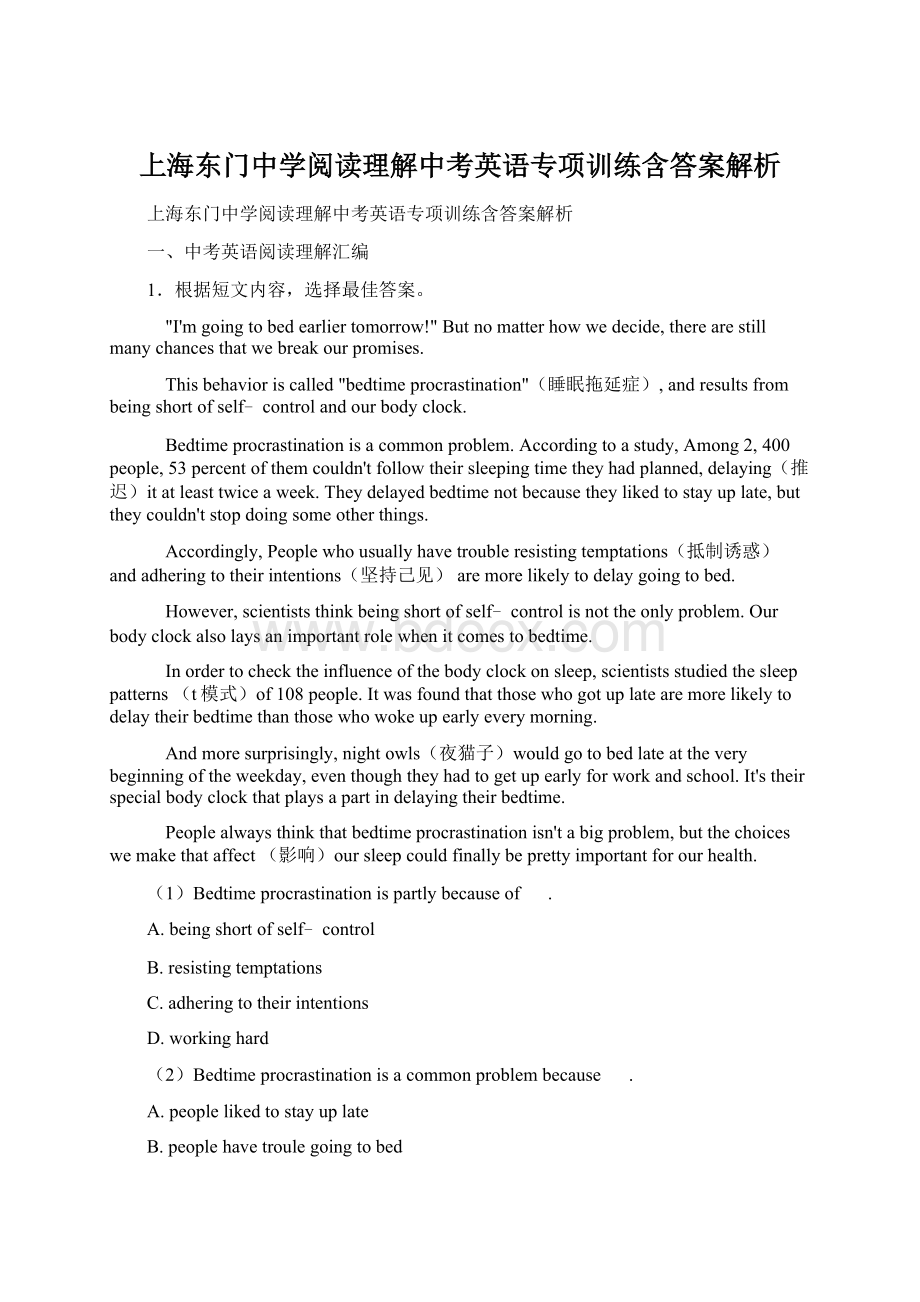上海东门中学阅读理解中考英语专项训练含答案解析.docx
《上海东门中学阅读理解中考英语专项训练含答案解析.docx》由会员分享,可在线阅读,更多相关《上海东门中学阅读理解中考英语专项训练含答案解析.docx(90页珍藏版)》请在冰豆网上搜索。

上海东门中学阅读理解中考英语专项训练含答案解析
上海东门中学阅读理解中考英语专项训练含答案解析
一、中考英语阅读理解汇编
1.根据短文内容,选择最佳答案。
"I'mgoingtobedearliertomorrow!
"Butnomatterhowwedecide,therearestillmanychancesthatwebreakourpromises.
Thisbehavioriscalled"bedtimeprocrastination"(睡眠拖延症),andresultsfrombeingshortofself﹣controlandourbodyclock.
Bedtimeprocrastinationisacommonproblem.Accordingtoastudy,Among2,400people,53percentofthemcouldn'tfollowtheirsleepingtimetheyhadplanned,delaying(推迟)itatleasttwiceaweek.Theydelayedbedtimenotbecausetheylikedtostayuplate,buttheycouldn'tstopdoingsomeotherthings.
Accordingly,Peoplewhousuallyhavetroubleresistingtemptations(抵制诱惑)andadheringtotheirintentions(坚持己见)aremorelikelytodelaygoingtobed.
However,scientiststhinkbeingshortofself﹣controlisnottheonlyproblem.Ourbodyclockalsolaysanimportantrolewhenitcomestobedtime.
Inordertochecktheinfluenceofthebodyclockonsleep,scientistsstudiedthesleeppatterns(t模式)of108people.Itwasfoundthatthosewhogotuplatearemorelikelytodelaytheirbedtimethanthosewhowokeupearlyeverymorning.
Andmoresurprisingly,nightowls(夜猫子)wouldgotobedlateattheverybeginningoftheweekday,eventhoughtheyhadtogetupearlyforworkandschool.It'stheirspecialbodyclockthatplaysapartindelayingtheirbedtime.
Peoplealwaysthinkthatbedtimeprocrastinationisn'tabigproblem,butthechoiceswemakethataffect(影响)oursleepcouldfinallybeprettyimportantforourhealth.
(1)Bedtimeprocrastinationispartlybecauseof .
A. beingshortofself﹣control
B. resistingtemptations
C. adheringtotheirintentions
D. workinghard
(2)Bedtimeprocrastinationisacommonproblembecause .
A. peoplelikedtostayuplate
B. peoplehavetroulegoingtobed
C. over50%ofpeoplecouldn'tsleepontime
D. peoplearenightowls
(3) peopleweretestedonthesleepinginfluenceofthebodyclock.
A. 2400 B. 53percentof C. 47percentof D. 108
(4)Accordingtothepassage,whichofthefollowingisNOTtrue?
A. Peoplewhogotuplatearemorelikelytodelaytheirbedtime.
B. Peoplewhowokeupearlymaynotdelaytheirbedtime.
C. Nightowlsalwaysgotuplate.
D. Nightowlsdelayedtheirbedtimeduetotheirspecialbodyclock.
(5)Thewriterimplies(暗示)thatbedtimeprocrastination .
A. isnotabigproblem
B. hasnoanyinfluenceonourbody
C. isthechoicewemake
D. isharmful
【答案】
(1)A
(2)C
(3)D
(4)C
(5)D
【解析】【分析】主要讲了睡眠拖延症,介绍了原因和危害。
(1)细节理解题。
根据Thisbehavioriscalled"bedtimeprocrastination"(睡眠拖延症),andresultsfrombeingshortofself﹣controlandourbodyclock.这种行为被称为"睡前拖延症"(beddimedelutination)是由于缺乏自我控制和我们的生物钟所致,故选A。
(2)细节理解题。
根据Theydelayedbedtimenotbecausetheylikedtostayuplate,buttheycouldn'tstopdoingsomeotherthings.他们推迟睡觉时间不是因为他们喜欢熬夜,而是因为他们不能停止做一些事情.,可只是因为超过50%的人不能按时睡觉,故选C。
(3)细节理解题。
根据Inordertochecktheinfluenceofthebodyclockonsleep,scientistsstudiedthesleeppatternsof108people为了检验生物钟对睡眠的影响,科学家研究了108人的睡眠模式,故选D。
(4)细节理解题。
根据 nightowls(夜猫子)wouldgotobedlateattheverybeginningoftheweekday,eventhoughtheyhadtogetupearlyforworkandschool. 夜猫子(nightowls)会在工作日的最开始很晚睡觉,即使他们必须早起上班和上学,可知夜猫子起床晚是错误的,故选C。
(5)细节题。
根据Peoplealwaysthinkthatbedtimeprocrastinationisn'tabigproblem,butthechoiceswemakethataffect(影响)oursleepcouldfinallybeprettyimportantforourhealth.人们总是认为睡前拖延不是一个大问题,但是我们做出的影响睡眠的选择最终可能对我们的健康非常重要,可知是有害的,故选D。
【点评】考查阅读理解,主要考查细节题,注意从文中仔细寻找答案。
2.阅读理解
Nowadayslotsofkidsareathomealoneafterschool.Areyouoneofthem?
Kidswhoregularlytakecareofthemselvesarecalled"latchkeykids".
Thisnicknamegotitsstartinthe1940s.ManymenfoughtintheSecondWorldWarandwomenhadtotakejobsinfactoriestokeepthecountrygoing.Withbothparentsaway,lotsofkidswentbacktoemptyhousesafterschool.Latchkeykidsworehousekeysaroundtheirnecksandtheyusedthekeystoopendoors.
Today,it'scommonforbothparentstowork.Asaresult,anewgenerationofkidsarespendingsometimealoneafterschool.Itbecomesnecessaryforbothparentsandkidstomakesomerules.Therearealotofquestionstotalkabout:
Shouldyoucallyourmum,ordadassoonasyougethome?
Shouldyoudoyourhomeworkfirst?
CanyouwatchTVorplaycomputergames?
Ifso,howlong?
Whatcanyoueatifyouwantasnack?
Canfriendscomeover?
Ifso,howmany?
……
Aslatchkeykids,knowinghowtostaysafeisjustasimportantasfollowingthefamilyrules.Talkaboutthefollowingquestionswithyourparents:
Whatshouldyoudowhenthephonerings?
Whatshouldyoudoifsomeoneknocksatthedoor?
Whatshouldyoudoifsomeoneb